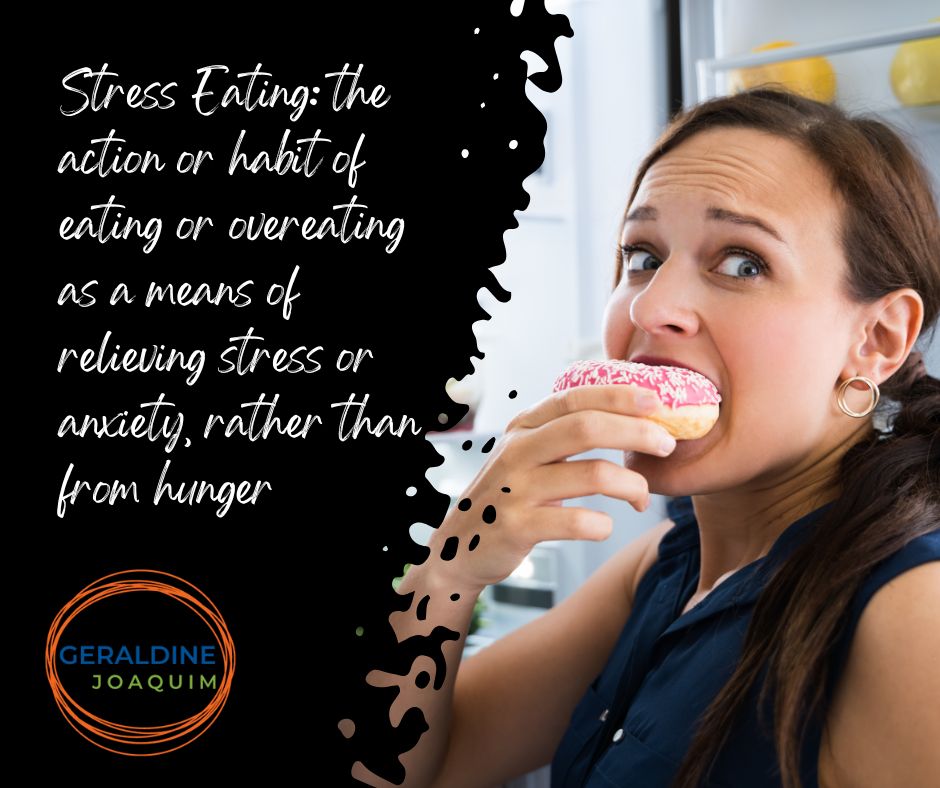
Are you stress eating?
“Stress Eating: the action or habit of eating or overeating as a means of relieving stress or anxiety, rather than from hunger”
– Oxford English Dictionary
For many people, food is as much about filling an emotional hole as it is a physical one, and stress
Stress eating affects around 46% of British adults*, with the biggest triggers being work and a stressful homelife. Women are more likely to emotionally eat at some point, and unfortunately this can become an unhealthy habit that sticks around way beyond the original stress trigger, it becomes part of the daily routine which can result in unhealthy food choices, disordered eating and ultimately weight gain.
It can feel like there’s an internal battle going on – on the one hand you know how and what you ‘should’ be eating, but you struggle to to get on top of your eating habits, and that’s because there’s all that emotion sitting behind the behaviour, the reasons other than physical hunger that are driving the need to eat.
So, how do you know if you’re responding to real physical hunger, or emotional hunger?
There’s this feeling that it doesn’t matter how much you eat, the hunger is never fully satisfied. It’s a hyper-response to food that is embedded in emotional connection and often it’s been there for a very long time.
A common example is as a child you might have been rewarded with food for good behaviour, or perhaps given your favourite treat if you felt sad or had a fall and hurt yourself. That kind of belief around food being a comforter is very sticky, it follows up through into adulthood.
Feeling sad? Have some ice cream! Feeling stressed? Eat a doughnut (or whatever your favourite treat is)! And they’re generally things you’d recognise as ‘comfort foods’, sweet treats, cakes and biscuits, chocolates, chips, crisps, stodgy puddings and warming foods…
Any situation that feels like an emotional rollercoaster and where you use food to calm yourself is likely to be stress eating. This kind of anxious eating is often rooted in childhood, and the tendency is to reach for childhood foods such as chocolate, biscuits, crisps. It’s a way of expressing anger or frustration, munching through those crunchy foods!
There’s a hormonal element too, because stress results in a release of cortisol, and your body will crave salt to help rebalance the adrenal glands where it’s produced. Additionally, those ultra-processed foods give you a dopamine hit, that’s your reward hormone, and it reinforces that neurological pathway that food makes you feel better, it helps you to manage stress.
You might also be ‘eating your stress’ as a way to cope with it. We have two operating systems: the sympathetic nervous system (SNS), your stress response, and the parasympathetic nervous system (PSNS), your rest and digest mode.
These systems are mutually exclusive, you cannot be stressed and relaxed at the same time, but you can fool your body into mimicking the PSNS mode. When you eat you’re indicating to your brain that all is well, there’s no stress around, look you’re eating and you wouldn’t be doing that if there’s danger around! So, the more you eat, the more you can keep those feelings of stress at bay… only it doesn’t really work out that way, because you might be pushing food into your body but your digestive system isn’t really ready to process it properly. That’s when you might start to notice digestive issues such as bloating, stomach aches, constipation or diarrhoea, even more serious conditions such as leaky gut syndrome which is linked to high levels of cortisol (stress hormone).
How do you break the cycle?
- Acknowledge the difference between physical and emotional hunger, and then you can explore how you can change the behaviour. By developing your self-awareness you can start to transform your relationship with food.
With physical hunger, we all have days when we need more nutrients or crave chocolate despite eating three meals, that’s normal. Your stomach rumbling is a definite indicator that it needs something in it! But emotional eating is different, the act of reaching for food comes from a place of stress or high emotion, a feeling that you can’t stop.
Think back to a moment when you’ve felt stressed, maybe you’ve been super-busy with work, or had an argument with someone, or perhaps you’ve been running from pillar to post, what about all those people wanting your attention..? Did you reach for a chocolate bar or snack, you sensed that you’re not hungry but you need something… you might think of it as being an energy boost but in the moment it’s really about coping, the food helps to alleviate those feelings.
- Recognise the craving when it happens and it’s intensity. All cravings are transient, it’s a state of the moment and will pass so how can you help it along? Perhaps drinking a glass of water will help alleviate it, or changing your environment by going for a little walk (just around the block or the garden will do!), or change what you’re doing such as try some deep breathing exercises to help calm yourself.
Or you could look for alternative foods that won’t impact on your health – instead of a biscuit or crisps, would a crunchy carrot suffice?
- Tune into your body’ signals, they’re there for a reason! If you’re someone who has a history of disordered eating, maybe bouncing from one fad diet to the next, going through periods of over-eating and deprivation, then you may have become a little disconnected from your body, losing touch with things like hunger cues in a bid to fit into another restrictive diet plan. If you find yourself craving dairy products like cheese, yogurt, butter, then your brain might be seeking some essential nutrient such as Vitamin A.
- Listen to your inner voices… we all have them, especially the inner critic that prompts you to binge, or the inner rebel that says “Go on, you deserve that treat!”. Start to notice the tone, the words, the circumstances and you’ll find that there are similarities because we tend to get stuck on the same things in the same ways over and over again.
Notice the language you use when talking to yourself, do you think of yourself in terms of being ‘good’ when you’re sticking to a diet, and ‘bad’ when you’re not (and usually when you’re bad, you’re so, so bad – you might as well eat everything because you’ll be going back on that diet again soon!). Instead of being ‘good’ or ‘bad’, be curious, and acknowledge that no one is 100% perfect all the time, it’s normal to eat pizza or have a bag of crisps from time to time, just not all the time.
- Notice your emotional state, stress eating can happen when you’re sad and when you’re happy. It’s about eating in response to emotions rather than physical hunger, and is usually accompanied by a feeling of being out of control. A tell-tale sign it’s emotionally-driven is if there’s a guilt hangover afterwards, that’s an indication of a comfort or reward element.
You might find yourself reaching for high-carb foods which can create mood swings, and also impacts on your blood sugar levels and the resulting insulin response. A solution may be to have healthier options at the ready, so you break the cycle.
- Look after yourself, include movement and moments of rest in your day, and prioritise your sleep. Sleep is the foundation of good health, when you’re sleep-deprived you’re more likely to experience mood swings, feel irritable, quick to anger or feel anxious, unable to focus or make decisions or think logically, you’re more likely to reach for sugary-fatty foods to replenish flagging energy levels, and to lack the capacity to recognise the emotional triggers that send you into stress eating behaviour.
- Keep a record of your hunger, this can help you to identify whether you’re physically hungry or seeking an emotional crutch. Note down things like how you’re feeling, identify the emotion (sad, happy, stressed, anxious, etc), what you’ve eaten, time of day (there’s usually a time pattern involved), how you feel after you’ve eaten the snack. This will help you become more aware of your eating patterns and cravings, and notice the foods you rely on – then you can make any adjustments, but do it slowly and with kindness.
If you’re one of the 46% of British adults who is struggling with emotional eating and you want to take back control, then this programme is for you! In the Kickstart Programme, we focus on the foundation of weight management which is all about mindset – those beliefs and habits you have around food.
For more information, click here
https://destressrefresh.samcart.com/products/kickstart-your-weight-loss-group
*Mental Health Foundation and YouGov study
